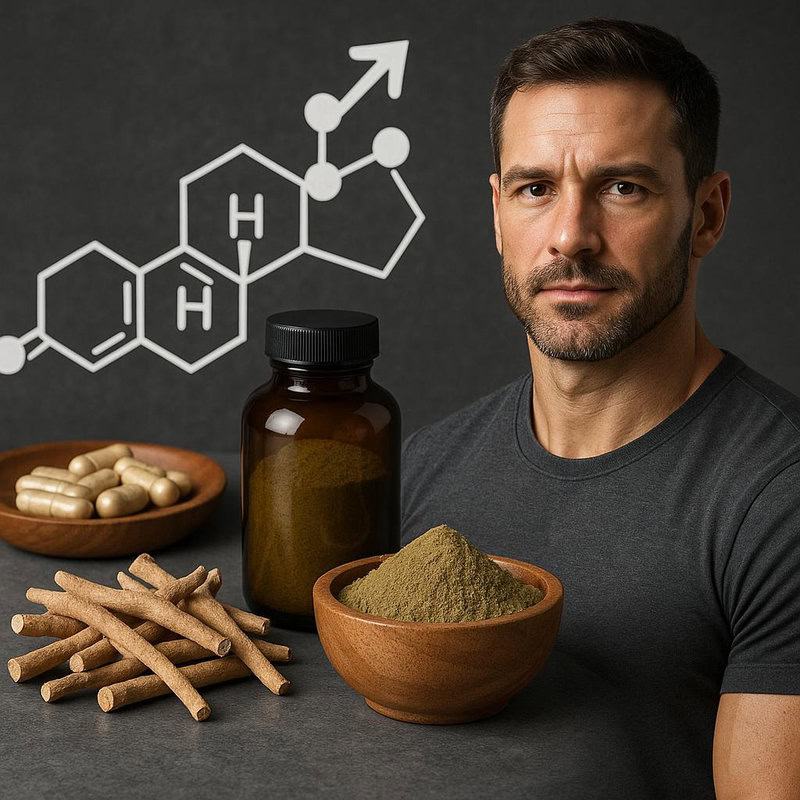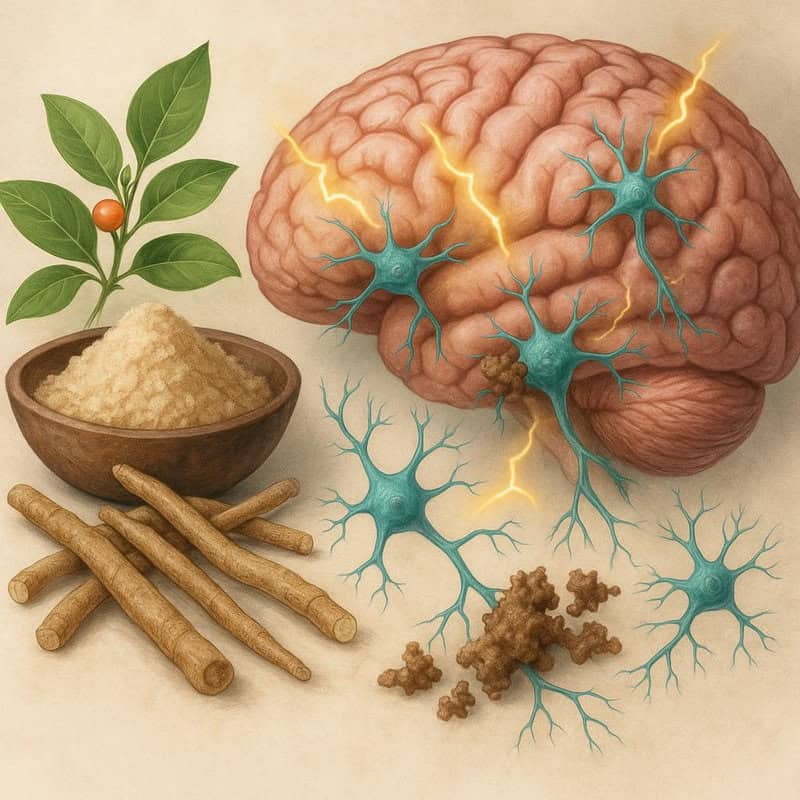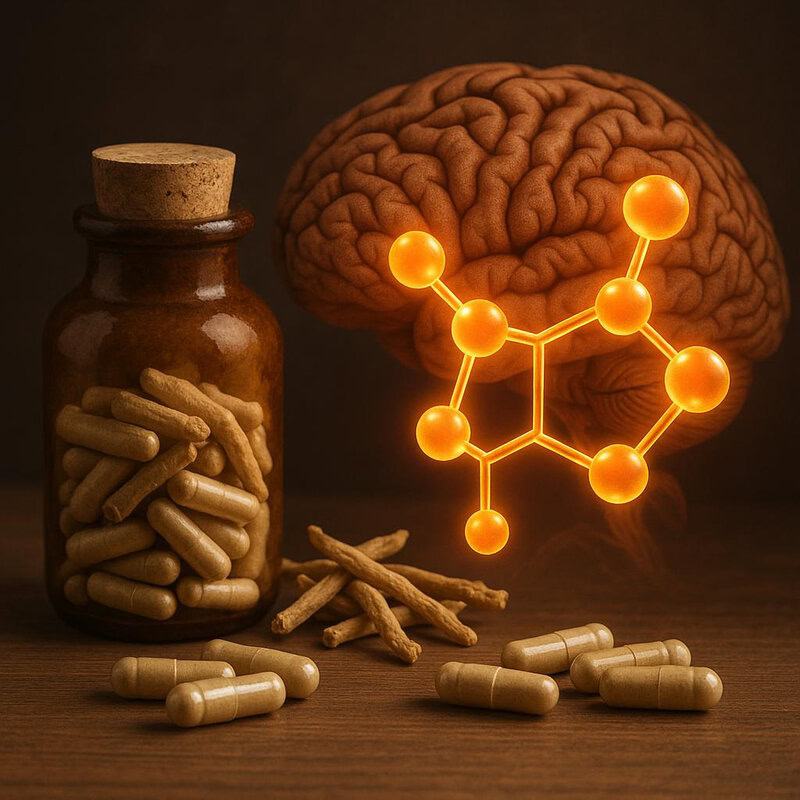Benefits of Ashwagandha and How Much To Take
Interest in Ashwagandha has surged recently, with global supplement sales rising due to its potential to support the nervous and endocrine systems. Clinical studies suggest it may help manage stress, anxiety, and hormone regulation (Frontiers in Human Neuroscience). However, one of the main challenges is the lack of standardization in supplement quality and recommended dosages, leading to confusion among consumers. Understanding these factors is crucial for maximizing the benefits of this ancient herbal remedy.
1. Stress Reduction

Ashwagandha is widely recognized for its adaptogenic properties, meaning it helps the body adapt to stress and maintain balance. Research has shown that Ashwagandha can reduce levels of cortisol, a hormone released by the adrenal glands in response to stress. Elevated cortisol is linked to chronic stress, anxiety, and various health issues. A randomized controlled trial published in the Indian Journal of Psychological Medicine found that participants taking Ashwagandha extract experienced a significant reduction in stress and serum cortisol levels compared to a placebo group.
In real-world settings, individuals use Ashwagandha supplements to manage daily stress, improve mood, and promote a sense of calm. Its adaptogenic effects can help buffer the impact of external stressors, making it popular among those with high-pressure jobs or demanding lifestyles. It is important for users to monitor their stress symptoms, such as feelings of overwhelm, irritability, sleep disturbances, and fatigue. Tracking these symptoms over time can help determine the effectiveness of Ashwagandha supplementation and guide adjustments to dosage or lifestyle strategies. For further information, see this Healthline article on Ashwagandha and stress.
2. Anxiety Relief

Ashwagandha has garnered attention for its potential to alleviate anxiety, with studies indicating its influence on the gamma-aminobutyric acid (GABA) system in the brain. The GABA neurotransmitter is essential for inhibiting neural activity and promoting relaxation, and Ashwagandha appears to enhance GABAergic signaling, leading to a calming effect. Research published in the Cureus Journal demonstrated significant reductions in anxiety scores in participants using Ashwagandha compared to placebo.
Compared to conventional anti-anxiety medications, such as benzodiazepines, Ashwagandha’s natural approach is less likely to cause side effects like sedation or dependence. While it may not produce the immediate effects seen with prescription drugs, its adaptogenic benefits and support of the nervous system can lead to gradual, sustainable anxiety relief. To track improvements, individuals should keep a journal noting the frequency, intensity, and triggers of anxiety episodes. Monitoring changes in sleep quality, social interactions, and physical symptoms like heart rate or gastrointestinal discomfort can also provide insight into the herb’s efficacy. For more details, visit this Medical News Today summary on Ashwagandha and anxiety.
3. Improved Sleep Quality

Ashwagandha has been studied for its positive effects on sleep quality, particularly through its impact on the regulation of the sleep-wake cycle. The herb contains compounds like triethylene glycol, which are believed to induce sleep by affecting neurotransmitters and promoting relaxation. Research published in the Cureus Journal found that participants taking Ashwagandha experienced significant improvements in both sleep onset latency and overall sleep quality compared to placebo.
Compared to conventional sleep aids such as melatonin, sedating antihistamines, or prescription medications, Ashwagandha is less likely to cause morning grogginess, dependence, or adverse side effects. Its adaptogenic properties allow it to address underlying stress and anxiety, which are common contributors to sleep disturbances, leading to a more natural and restorative sleep pattern.
To incorporate Ashwagandha for better rest, consider taking a standardized extract 30 to 60 minutes before bedtime. Pairing its use with good sleep hygiene habits—such as maintaining a consistent bedtime routine, limiting screen time before bed, and creating a calm sleep environment—can enhance its effectiveness. For additional insights, see this Sleep Foundation guide to Ashwagandha and sleep.
4. Enhanced Cognitive Function

Ashwagandha is increasingly recognized for its neuroprotective properties, which may help improve memory, focus, and overall cognitive performance. The herb is rich in withanolides, compounds that exhibit antioxidant and anti-inflammatory effects, protecting nerve cells from oxidative damage and supporting brain health. A study in the Journal of Dietary Supplements indicated that adults taking Ashwagandha extract demonstrated significant improvements in immediate and general memory, attention, and information processing speed compared to those on placebo.
In real-life scenarios, students, professionals, and older adults have used Ashwagandha to support cognitive clarity during periods of high demand or age-related decline. These benefits are particularly valuable for those experiencing brain fog, forgetfulness, or difficulty concentrating due to stress or fatigue. The adaptogenic effects of Ashwagandha may help sharpen mental acuity by reducing the negative cognitive impacts of chronic stress.
To notice cognitive changes, individuals should track their ability to recall information, focus on tasks, and process new concepts. Keeping a journal or using brain training apps can help monitor improvements over time. Further reading is available at the Healthline overview of Ashwagandha and brain function.
5. Anti-Inflammatory Properties

Ashwagandha has demonstrated significant anti-inflammatory effects, making it a valuable herbal remedy for individuals dealing with chronic inflammation. Its active compounds, particularly withanolides, have been found to lower key inflammation markers such as C-reactive protein (CRP) and interleukin-6 (IL-6). A clinical study published in the Journal of Ayurveda and Integrative Medicine reported that patients with rheumatoid arthritis who supplemented with Ashwagandha experienced measurable reductions in pain and swelling, along with decreased levels of inflammatory biomarkers.
These findings suggest that Ashwagandha may be beneficial for people with autoimmune or inflammatory conditions, such as arthritis, by alleviating joint pain, stiffness, and swelling. Its effects are thought to result from both direct inhibition of inflammatory pathways and indirect reduction of oxidative stress.
For individuals with chronic inflammation, it’s important to monitor symptoms such as recurring pain, persistent fatigue, swelling, and changes in mobility. Regular blood tests to track inflammation markers can provide additional insights into Ashwagandha’s impact. Combining supplementation with an anti-inflammatory diet and lifestyle may further enhance results. For more details, review this Medical News Today article on Ashwagandha and inflammation.
6. Support for Immune Function

Ashwagandha has been shown to enhance immune function, largely through its influence on white blood cells and the modulation of immune responses. Research suggests that Ashwagandha can increase the production and activity of lymphocytes, natural killer cells, and macrophages—key players in the body’s defense against infections and disease. A study published in the Journal of Ayurveda and Integrative Medicine noted improvements in several immune parameters among healthy adults taking Ashwagandha supplements, including heightened white blood cell counts and improved antibody response.
In comparison to other popular immune boosters like echinacea and elderberry, Ashwagandha offers a broader spectrum of benefits, due to its adaptogenic and anti-inflammatory effects. While echinacea is often used for short-term immune stimulation, Ashwagandha is better suited for ongoing support and the management of immune-related stress responses.
To promote immune health, consider combining Ashwagandha supplementation with general wellness practices such as maintaining a balanced diet rich in antioxidants, getting regular exercise, prioritizing quality sleep, and managing stress. For further insights into immune benefits, visit this Healthline guide on Ashwagandha and immune function.
7. Enhanced Physical Performance

Ashwagandha has become increasingly popular among athletes and fitness enthusiasts for its potential to boost muscle strength, endurance, and overall physical performance. The herb’s adaptogenic qualities may help reduce exercise-induced stress and support faster recovery. Several studies have investigated its impact on athletic performance, including a randomized controlled trial published in the Journal of the International Society of Sports Nutrition which found that participants supplementing with Ashwagandha experienced significant increases in muscle mass and strength, as well as improvements in cardiorespiratory endurance, compared to the placebo group.
Ashwagandha’s mechanisms likely involve the modulation of cortisol and other stress hormones, which contribute to muscle breakdown, as well as its antioxidant effects that may reduce exercise-related inflammation. These benefits make it a promising supplement for athletes engaged in strength training, endurance sports, or high-intensity interval training (HIIT).
For athletes, integrating Ashwagandha into a balanced nutrition and training program may help optimize results. It is often taken in capsule or powder form, with dosages tailored to individual needs. For more on application and research, see this Examine.com summary on Ashwagandha and exercise performance.
8. Increased Testosterone Levels

Ashwagandha is noted for its potential to support hormonal balance in men, particularly through the modulation of testosterone. Clinical research has shown that Ashwagandha supplementation can lead to significant increases in serum testosterone levels, especially in men experiencing stress or infertility. A double-blind, placebo-controlled study published in the Journal of the International Society of Sports Nutrition found that male participants taking Ashwagandha exhibited notably higher testosterone and luteinizing hormone levels compared to a placebo group, alongside improvements in muscle strength and body composition.
Unlike pharmaceutical testosterone therapy, which involves synthetic hormones and may carry risks of adverse effects, Ashwagandha acts by supporting the body’s natural hormone production and stress response. This makes it an attractive alternative for those seeking a natural approach to optimizing testosterone without the side effects often associated with conventional treatments.
Men supplementing with Ashwagandha should monitor for signs of hormonal changes, such as increased energy, enhanced libido, improved mood, and changes in muscle mass or body composition. Periodic blood tests can help track testosterone levels and assess the supplement’s effectiveness. For more information, visit this Healthline article on Ashwagandha and testosterone.
9. Enhanced Fertility in Men

Ashwagandha has shown promising results in improving male fertility, particularly by enhancing sperm quality and reproductive health. Clinical trials indicate that supplementation with Ashwagandha can lead to increases in sperm concentration, motility, and overall semen quality. A randomized placebo-controlled study published in Evidence-Based Complementary and Alternative Medicine found that men with low sperm count who took Ashwagandha root extract for 90 days experienced significant improvements in sperm count, volume, and motility, as well as higher antioxidant levels in their semen.
These effects are thought to result from Ashwagandha’s ability to reduce oxidative stress, balance reproductive hormones, and promote overall vitality. The herb’s adaptogenic properties also help mitigate stress, a known factor that can negatively impact fertility outcomes.
For couples trying to conceive, it is important to address both partners’ health, adopt a balanced diet, and manage factors such as stress and environmental exposures. Men considering Ashwagandha for fertility should consult a healthcare provider, particularly if they are already receiving fertility treatments. For deeper insights, visit this PubMed article on Ashwagandha and male fertility.
10. Blood Sugar Regulation

Ashwagandha has been investigated for its ability to help regulate blood sugar levels, making it a potential adjunct in the management of diabetes and metabolic syndrome. The herb appears to improve insulin sensitivity and lower fasting blood glucose by influencing various metabolic pathways. A systematic review published in the Journal of Ethnopharmacology found that multiple clinical trials reported reductions in blood sugar among people with type 2 diabetes who supplemented with Ashwagandha, compared to placebo groups.
Case studies have documented improvements in both fasting and postprandial (after meal) glucose levels, as well as reductions in key markers like hemoglobin A1c, which reflects long-term blood sugar control. These benefits are believed to stem from Ashwagandha’s role in enhancing insulin secretion, improving insulin sensitivity, and reducing stress-related hormonal imbalances that can negatively affect glucose metabolism.
Individuals interested in using Ashwagandha to support blood sugar regulation should regularly monitor their blood glucose levels using a home glucometer or continuous glucose monitor (CGM). It is also advisable to track dietary habits and physical activity, as these factors play significant roles in glycemic control. For more information, visit this Healthline summary on Ashwagandha and blood sugar.
11. Lowering Cholesterol

Ashwagandha has demonstrated lipid-lowering effects, supporting cardiovascular health by reducing total cholesterol, LDL (“bad” cholesterol), and triglycerides, while sometimes increasing HDL (“good” cholesterol). The mechanisms behind these effects involve Ashwagandha’s antioxidant properties and ability to reduce oxidative stress, which can otherwise contribute to plaque formation in the arteries. A controlled study published in the Journal of Ayurveda and Integrative Medicine found that individuals taking Ashwagandha root powder for 30 days saw significant decreases in cholesterol and triglyceride levels compared to the placebo group.
While statins remain the most commonly prescribed medications for managing high cholesterol, Ashwagandha offers a natural alternative or complementary approach, especially for those seeking to avoid potential side effects associated with long-term statin use. However, the cholesterol-lowering effects of Ashwagandha may be milder and gradual compared to pharmaceutical statins.
Signs of improved cardiovascular health can include increased energy, reduced fatigue during physical activity, and improved results on blood lipid panels. Individuals should work with their healthcare provider to monitor cholesterol, blood pressure, and other cardiovascular risk factors. For further reading, visit this Healthline article on Ashwagandha and cholesterol.
12. Anti-Cancer Potential

Ashwagandha has attracted scientific interest for its potential anti-cancer properties, primarily attributed to its strong antioxidant effects and active phytochemicals, such as withaferin A. These compounds may help inhibit the growth of cancer cells by neutralizing free radicals and reducing DNA damage. In animal model studies, Ashwagandha extract has been shown to slow tumor growth and induce apoptosis (programmed cell death) in certain types of cancer, including breast, colon, and lung cancers. For example, a review in the Cureus Journal highlights promising preclinical findings regarding Ashwagandha’s cytotoxic effects on cancer cells.
Despite these encouraging laboratory and animal results, it is important to exercise caution when considering Ashwagandha as an anti-cancer therapy. Human clinical trials are limited, and the herb should not be viewed as a replacement for established cancer treatments. The efficacy, safety, and optimal dosing for cancer prevention or adjunctive therapy remain to be determined in large-scale, controlled human studies.
Anyone interested in using Ashwagandha as part of a cancer management plan should consult with a qualified healthcare provider. For more details on the current research landscape, visit this National Cancer Institute page on Ashwagandha.
13. Thyroid Function Support

Ashwagandha has shown potential in supporting thyroid health by modulating thyroid hormone levels, particularly in individuals with hypothyroidism. The herb appears to stimulate the production of thyroxine (T4) and triiodothyronine (T3), which are essential hormones for maintaining metabolic activity. A double-blind, placebo-controlled study published in the Journal of Alternative and Complementary Medicine found that adults with subclinical hypothyroidism who took Ashwagandha root extract for eight weeks experienced significant improvements in TSH, T3, and T4 levels compared to the placebo group.
Real-world case reports and anecdotal evidence suggest that some individuals with mild hypothyroidism have noticed increased energy, improved mood, and reduced symptoms such as fatigue and weight gain after supplementing with Ashwagandha. These improvements are thought to stem from the herb’s adaptogenic and stress-reducing properties, which may positively affect the hypothalamic-pituitary-thyroid (HPT) axis.
It is crucial to consult a healthcare provider before using Ashwagandha for thyroid support, especially for those already on thyroid medication or with a history of thyroid disorders. Regular monitoring of thyroid hormone levels and symptom changes is advised. For more information, see this Healthline article on Ashwagandha and thyroid health.
14. Increased Energy Levels

Ashwagandha is often praised for its ability to enhance energy and combat fatigue, an effect attributed to its support of mitochondrial function. Mitochondria are the powerhouses of cells, responsible for generating ATP—the primary energy currency in the body. Research suggests that Ashwagandha’s antioxidant compounds help protect mitochondria from oxidative stress and improve cellular energy production. A study published in the Journal of Ethnopharmacology observed that individuals supplementing with Ashwagandha reported reduced fatigue and greater energy throughout the day compared to a placebo group.
Unlike stimulants such as caffeine, which provide a rapid but short-lived energy boost, Ashwagandha works gradually to restore vitality by addressing underlying causes of fatigue like chronic stress, inflammation, and hormonal imbalances. This makes it a suitable option for those experiencing persistent tiredness or burnout.
To notice increased vitality, pay attention to sustained physical activity levels, improved exercise performance, better focus, and reduced reliance on naps or stimulants. Tracking daily patterns in energy and alertness can help determine the herb’s impact. For further reading, see this Medical News Today article on Ashwagandha and energy.
15. Reduction of Depression Symptoms

Ashwagandha has been studied for its potential role in alleviating symptoms of depression, thanks to its influence on neurotransmitter balance. The herb appears to modulate key chemical messengers in the brain, such as serotonin, dopamine, and GABA, which play crucial roles in regulating mood and emotional well-being. These effects may be linked to Ashwagandha’s adaptogenic properties and its ability to lower cortisol, the body’s primary stress hormone. A randomized, double-blind, placebo-controlled trial published in the Indian Journal of Psychological Medicine observed significant improvements in depression scores among participants using Ashwagandha extract compared to those taking a placebo.
Although Ashwagandha is not a replacement for conventional antidepressants, it may offer a complementary approach for those experiencing mild to moderate depressive symptoms, especially when related to stress or hormonal imbalance. Its gentle action and favorable side effect profile make it appealing to individuals seeking natural mood support.
To assess changes in mood, consider keeping a daily journal tracking feelings of sadness, motivation, interest in activities, and sleep patterns. If symptoms persist or worsen, consult a mental health professional. For more insights, visit this Healthline summary on Ashwagandha and depression.
16. Improved Heart Health

Ashwagandha contributes to heart health through several mechanisms, notably by promoting vascular relaxation and supporting healthy blood pressure. The herb’s antioxidant and anti-inflammatory properties help relax blood vessel walls, enhance circulation, and reduce the overall workload on the heart. Clinical data published in the Journal of Ayurveda and Integrative Medicine demonstrated that Ashwagandha supplementation led to significant reductions in both systolic and diastolic blood pressure among study participants, alongside improvements in lipid profiles and reductions in markers of vascular inflammation.
These effects suggest that Ashwagandha may be beneficial for those at risk of hypertension or cardiovascular disease. While its impact on blood pressure may be milder than prescription medications, the herb offers a natural approach to heart health, particularly when incorporated as part of a comprehensive lifestyle plan.
For optimal results, integrate Ashwagandha with other heart-healthy habits such as a balanced diet rich in fruits and vegetables, regular physical activity, stress management techniques, and avoiding tobacco. Routine monitoring of blood pressure and cardiovascular markers can help track progress. For more information, see this Healthline overview on Ashwagandha and heart health.
17. Anti-Aging Effects

Ashwagandha is gaining recognition as a potential anti-aging supplement, thanks to its effects on cellular aging processes. The herb’s potent antioxidant content helps neutralize free radicals, which are responsible for cellular damage and contribute to visible signs of aging and age-related diseases. Ashwagandha also supports telomere integrity—structures at the ends of chromosomes that naturally shorten with age, as described in a Journal of Ethnopharmacology review. By reducing oxidative stress and inflammation, Ashwagandha may help slow down telomere shortening and promote healthy cellular function.
Compared to other anti-aging supplements like resveratrol, coenzyme Q10, or curcumin, Ashwagandha offers a broad spectrum of benefits that extend beyond antioxidant support. Its adaptogenic properties address the impact of chronic stress—a significant factor in accelerated aging—while also supporting immune, hormonal, and cognitive health. This multifaceted approach can make Ashwagandha a foundational element in a holistic anti-aging regimen.
Over time, users may notice improvements in energy, skin appearance, cognitive clarity, and overall resilience to stress. However, as with all anti-aging strategies, results are gradual and best achieved through consistent, long-term use combined with a healthy lifestyle. For more, see this Medical News Today article on Ashwagandha and anti-aging.
18. Improved Sexual Function

Ashwagandha has a long-standing reputation as an aphrodisiac in traditional Ayurvedic medicine, and modern research supports its potential to enhance sexual function in both men and women. The herb’s libido-boosting effects are attributed to its ability to reduce stress, balance sex hormones, and improve blood flow by promoting nitric oxide production. These mechanisms can increase arousal, stamina, and satisfaction. A double-blind, placebo-controlled study published in the Journal of Ethnopharmacology demonstrated that women supplementing with Ashwagandha experienced significant improvements in sexual function, including increased desire, lubrication, and orgasm.
For men, clinical trials have shown that Ashwagandha can enhance erectile function, libido, and sperm quality, likely due to its impact on testosterone and stress reduction. The adaptogenic nature of Ashwagandha makes it especially valuable for individuals experiencing stress-related sexual dysfunction.
To benefit from Ashwagandha’s effects on intimacy, it is commonly taken as a standardized extract in capsule or powder form, often integrated into a daily wellness routine. Open communication with partners and a focus on overall health—including stress management, regular exercise, and proper sleep—can further improve sexual well-being. For more, see this Healthline guide to Ashwagandha and sexual health.
19. Enhanced Muscle Mass

Ashwagandha has been shown to promote muscle growth and enhance strength, making it a popular supplement among bodybuilders and fitness enthusiasts. Its anabolic effects are largely attributed to its ability to reduce cortisol levels, which can otherwise contribute to muscle breakdown, and to support testosterone production, a key hormone for muscle development. A randomized, double-blind, placebo-controlled trial published in the Journal of the International Society of Sports Nutrition found that resistance-trained men who took Ashwagandha for eight weeks experienced significantly greater increases in muscle mass and strength compared to those taking a placebo.
Real-world examples from the bodybuilding community highlight Ashwagandha’s potential to aid muscle recovery, reduce exercise-induced muscle damage, and support lean body composition. These benefits make it a valuable addition to intensive training regimens.
For best results, combine Ashwagandha supplementation with a structured strength-training program, adequate protein intake, and proper rest. Consistency in both exercise and supplementation is key for maximizing gains. Monitoring progress through body measurements, strength assessments, and recovery rates can help determine effectiveness. For more information, see this Examine.com resource on Ashwagandha and muscle mass.
20. Support for Adrenal Health

Ashwagandha is frequently recommended for supporting adrenal health, particularly in the context of so-called “adrenal fatigue”—a non-medical term used to describe symptoms like chronic tiredness, low motivation, and stress intolerance, thought to result from prolonged stress and overworked adrenal glands. The herb’s adaptogenic properties help regulate the hypothalamic-pituitary-adrenal (HPA) axis, which governs the body’s stress response and cortisol production. Clinical trials, such as one detailed in the Indian Journal of Psychological Medicine, show that Ashwagandha supplementation can significantly lower cortisol levels and improve overall resilience to stress.
In real-world adrenal support protocols, Ashwagandha is often combined with other lifestyle interventions, including restorative sleep, balanced nutrition, mindfulness practices, and gentle exercise. These holistic approaches aim to reduce the impact of chronic stress and support adrenal recovery. Ashwagandha’s versatility and safety profile make it a common choice for those experiencing burnout or chronic fatigue.
It is important to note that symptoms of “adrenal fatigue” may overlap with recognized endocrine or psychological conditions. Individuals with persistent fatigue, unexplained weight changes, or severe stress should consult a healthcare provider for proper diagnosis and management. For a clinical overview, visit this Healthline article on adrenal health and Ashwagandha.
21. Improved Memory

Ashwagandha has demonstrated promising effects on memory enhancement, partly due to its ability to stimulate neurogenesis—the formation of new neurons—in brain regions associated with learning and memory. The herb’s active constituents, notably withanolides, have antioxidant and anti-inflammatory effects that protect brain cells from oxidative stress and promote synaptic plasticity. Clinical trials, such as one published in the Journal of Dietary Supplements, found that adults taking Ashwagandha extract showed significant improvements in memory, attention, and information processing speed compared to those receiving a placebo.
Comparisons of memory tasks in these studies highlight that Ashwagandha supplementation can enhance both immediate and general memory performance, making it beneficial for students, professionals, and older adults experiencing age-related cognitive decline. The benefits are often most noticeable in tasks that require quick recall, sustained attention, and the ability to learn new information.
For practical cognitive support, combine Ashwagandha with brain-healthy habits such as regular mental exercises, adequate sleep, balanced nutrition, and stress management. Tracking changes in memory performance using journals or cognitive apps can help document progress. For more information, see this Healthline article on Ashwagandha and memory.
22. Lowered Blood Pressure

Ashwagandha has been studied for its potential to lower blood pressure, primarily through its vasodilation effects and ability to reduce stress-induced hypertension. The herb’s active compounds promote relaxation of blood vessel walls, enhance nitric oxide production, and decrease oxidative stress, all of which contribute to improved blood flow and reduced vascular resistance. A clinical trial published in the Journal of Ayurveda and Integrative Medicine found that Ashwagandha supplementation led to meaningful reductions in both systolic and diastolic blood pressure in participants with elevated readings.
When compared to conventional antihypertensive drugs, Ashwagandha’s effects are typically milder and more gradual. While prescription medications may provide rapid and significant blood pressure reductions, Ashwagandha offers a more natural, holistic approach with a lower risk of side effects. It may serve as a complementary option for individuals with mild hypertension or for those seeking additional support alongside lifestyle changes.
To effectively monitor blood pressure, use a reliable home blood pressure monitor and track readings at consistent times each day. Maintaining a record of results helps assess the impact of Ashwagandha and other interventions. For more information, consult this Healthline article on Ashwagandha and blood pressure.
23. Antioxidant Protection

Ashwagandha is celebrated for its robust antioxidant properties, which help protect the body from the damaging effects of free radicals. Free radicals are unstable molecules that can cause oxidative stress, leading to cellular damage and contributing to aging, inflammation, and various chronic diseases. The withanolides and other bioactive compounds in Ashwagandha act as free radical scavengers, neutralizing these harmful molecules and supporting cellular integrity. A study published in the Journal of Ethnopharmacology demonstrated significant increases in antioxidant enzyme activity, such as superoxide dismutase (SOD) and catalase, in individuals supplementing with Ashwagandha.
When compared to other antioxidant supplements like vitamin C, vitamin E, or coenzyme Q10, Ashwagandha offers a unique combination of antioxidant, adaptogenic, and anti-inflammatory benefits. Its multifaceted action makes it a valuable addition to a daily regimen focused on comprehensive cellular protection and stress resilience.
Long-term benefits of enhanced antioxidant protection include healthier aging, improved immune function, reduced risk of chronic diseases, and increased vitality. Incorporating Ashwagandha with a diet rich in colorful fruits and vegetables can further bolster the body’s defense against oxidative damage. For more insights, visit this Healthline guide on Ashwagandha and antioxidants.
24. Pain Relief

Ashwagandha has demonstrated anti-nociceptive, or pain-blocking, properties that can be beneficial for individuals suffering from chronic pain. The herb’s active constituents, including withanolides, exert their effects by modulating inflammatory pathways and reducing the sensitivity of pain receptors. Animal and human studies have indicated that Ashwagandha supplementation may decrease the perception of pain by interfering with the transmission of pain signals in the nervous system. A clinical trial published in the Journal of Ayurveda and Integrative Medicine found that patients with osteoarthritis experienced significant reductions in joint pain and stiffness when using Ashwagandha extract, compared to placebo.
These effects make Ashwagandha a promising natural option for managing conditions such as arthritis, fibromyalgia, or general musculoskeletal pain. Unlike conventional painkillers, Ashwagandha’s pain-relieving action is typically slower but may come with fewer side effects and additional benefits for overall well-being.
When using Ashwagandha for pain management, signs of improvement may include reduced intensity and frequency of pain episodes, increased daily activity, and enhanced mobility. Keeping a pain diary can help track these changes over time. For more information, see this Medical News Today overview on Ashwagandha and pain relief.
25. Enhanced Focus and Attention

Ashwagandha is increasingly recognized for its ability to enhance focus and attention, largely due to its modulatory effects on neurotransmitters such as acetylcholine, dopamine, and GABA. These neurotransmitters play vital roles in maintaining alertness, sustaining concentration, and supporting executive function. A randomized, placebo-controlled study published in the Journal of Dietary Supplements found that participants supplementing with Ashwagandha extract showed significant improvements in task-based attention and cognitive performance compared to those on placebo.
Compared to traditional stimulants like caffeine or prescription medications for attention disorders, Ashwagandha offers a gentler and more sustainable boost to mental clarity without the risk of jitteriness or dependency. Its adaptogenic properties help buffer the negative effects of stress, which can otherwise derail productivity and focus during cognitively demanding tasks.
To use Ashwagandha for enhanced focus, consider taking a standardized extract daily, ideally as part of a morning or midday routine. Pairing supplementation with productivity strategies—such as structured work intervals, regular breaks, and mindfulness practices—can further amplify benefits. Monitoring improvements through productivity logs or attention-tracking apps can provide valuable feedback. For more, visit this Healthline article on Ashwagandha and focus.
26. Reduced Menopausal Symptoms

Ashwagandha has shown promise in alleviating a variety of menopausal symptoms by supporting hormone balance and mitigating the impact of stress on the endocrine system. Menopause is characterized by fluctuating estrogen and progesterone levels, often leading to symptoms such as hot flashes, mood swings, insomnia, and fatigue. Ashwagandha’s adaptogenic properties help stabilize the hypothalamic-pituitary-adrenal (HPA) axis, which may ease these symptoms by promoting hormonal equilibrium. A randomized, double-blind study published in the Journal of Alternative and Complementary Medicine found that women taking Ashwagandha experienced significant reductions in menopause-related symptoms, including irritability, anxiety, and sleep disturbances, compared to a placebo group.
Case studies and real-world reports frequently highlight improvements in sleep quality, reduced severity of hot flashes, and enhanced overall well-being among menopausal women using Ashwagandha. The herb’s gentle support of mood and energy can be particularly beneficial during this transitional period.
To track improvements, women are encouraged to keep a daily symptom journal, noting changes in sleep, mood, frequency of hot flashes, and overall quality of life. Regular check-ins with a healthcare provider can further personalize and optimize the approach. For more, see this Healthline article on Ashwagandha and menopause.
27. Support for Weight Management

Ashwagandha may contribute to healthy weight management by influencing metabolic rate, reducing stress-related food cravings, and supporting fat loss. The herb’s adaptogenic effects help regulate cortisol, a hormone associated with abdominal fat accumulation and emotional eating. A randomized, double-blind, placebo-controlled study published in the Journal of Evidence-Based Complementary & Alternative Medicine showed that adults supplementing with Ashwagandha experienced significant reductions in body weight, body mass index (BMI), and perceived stress levels compared to those taking a placebo.
Compared to standard weight loss supplements and stimulants, Ashwagandha offers a holistic approach, addressing not just metabolism but also the psychological components of weight gain. Its ability to improve energy, mood, and sleep further supports sustainable lifestyle changes essential for long-term weight management.
To effectively incorporate Ashwagandha into a weight management regimen, pair supplementation with balanced nutrition, regular physical activity, and mindful eating practices. Tracking progress through regular weigh-ins, measurements, and food diaries can help assess effectiveness and motivate ongoing efforts. For further details, see this Healthline article on Ashwagandha and weight loss.
28. Support for Autoimmune Disorders

Ashwagandha’s unique immune-modulating properties have attracted interest for its potential role in managing autoimmune disorders. The herb is believed to favorably balance the immune response by reducing excessive inflammation without broadly suppressing immune function. Its active compounds, including withanolides, help downregulate pro-inflammatory cytokines and may reduce the severity of autoimmune flare-ups. A review published in the Cureus Journal highlights Ashwagandha’s immunomodulatory effects and mentions favorable outcomes in early studies on conditions like rheumatoid arthritis and lupus.
Case reports and preliminary clinical evidence suggest that Ashwagandha may help alleviate symptoms such as joint pain, fatigue, and inflammation in individuals with autoimmune diseases. However, the evidence is still emerging, and responses can vary widely depending on the specific autoimmune condition and individual immune system characteristics.
For those with diagnosed autoimmune disorders, it is essential to consult a healthcare provider before starting Ashwagandha, as immune modulation can sometimes affect disease progression or interact with medications. Ongoing monitoring for symptom changes and regular medical check-ins are crucial. For more insights, visit this Healthline article on Ashwagandha and autoimmune health.
29. Support for Liver Health

Ashwagandha has demonstrated hepatoprotective properties, making it a valuable herb for supporting liver health. Its potent antioxidant and anti-inflammatory compounds help protect liver cells from damage caused by toxins, oxidative stress, and inflammation. Animal studies and preliminary human research, such as those summarized in the Journal of Ethnopharmacology, have found that Ashwagandha supplementation can reduce elevated liver enzymes—markers of liver stress or injury—and improve overall liver function.
Clinical studies indicate that Ashwagandha may help normalize levels of alanine aminotransferase (ALT) and aspartate aminotransferase (AST), two enzymes that can become elevated in liver disorders. These effects are attributed to Ashwagandha’s ability to scavenge free radicals, reduce inflammation, and support the body’s natural detoxification processes.
For practical liver care, combine Ashwagandha supplementation with healthy lifestyle habits such as limiting alcohol intake, maintaining a balanced diet low in processed foods, staying hydrated, and engaging in regular physical activity. Routine blood tests to monitor liver enzyme levels can provide early detection of any issues and track improvement over time. For further reading, visit this Healthline article on Ashwagandha and liver support.
30. Improved Gut Health

Ashwagandha is increasingly recognized for its positive effects on gut health, owing to its impact on the gut microbiota and gastrointestinal (GI) function. The herb’s adaptogenic and anti-inflammatory properties help soothe the digestive tract, reduce inflammation, and promote a healthy balance of beneficial gut bacteria. Research, such as that highlighted in the Journal of Ethnopharmacology, suggests that Ashwagandha supplementation may improve symptoms of irritable bowel syndrome (IBS), bloating, and general digestive discomfort.
Compared to conventional digestive aids like probiotics or fiber supplements, Ashwagandha offers a more holistic approach by addressing the mind-gut connection and reducing stress-related GI symptoms. Chronic stress is known to negatively affect gut motility and microbiota composition, and Ashwagandha’s stress-buffering effects may indirectly enhance digestive health and nutrient absorption.
To monitor GI improvements, individuals should pay attention to changes in bowel regularity, reduction of bloating or abdominal pain, and overall digestive comfort. Keeping a food and symptom diary can help identify triggers and track progress over time. For more information, see this Healthline article on Ashwagandha and gut health.
31. Reduced Oxidative Stress

Ashwagandha is well-regarded for its ability to reduce oxidative stress, a key factor linked to aging and a wide array of chronic diseases. The herb’s bioactive compounds, particularly withanolides, enhance the body’s endogenous antioxidant defenses and help neutralize free radicals. Clinical studies, such as those summarized in the Journal of Ethnopharmacology, have shown that Ashwagandha supplementation can significantly lower levels of oxidative stress markers like malondialdehyde (MDA) and increase protective enzymes, including superoxide dismutase (SOD) and glutathione peroxidase.
When compared to other antioxidant supplements such as vitamin C, vitamin E, or alpha-lipoic acid, Ashwagandha offers a broader range of systemic benefits by combining antioxidant, anti-inflammatory, and adaptogenic effects. This makes it a valuable addition to a holistic regimen aimed at minimizing cellular damage and supporting long-term health.
Signs of reduced oxidative stress may include improvements in energy, skin clarity, recovery from exercise, and a reduction in inflammation-related symptoms. Regular blood tests assessing oxidative stress markers and antioxidant enzyme activity can offer objective insights. For more details, visit this Healthline guide to Ashwagandha and oxidative stress.
32. Support for Chronic Fatigue Syndrome

Ashwagandha may offer meaningful support for individuals with Chronic Fatigue Syndrome (CFS) due to its dual action on energy regulation and immune modulation. Its adaptogenic properties help balance the body’s stress response and support mitochondrial function, potentially improving cellular energy production. The herb’s immunomodulatory effects also help regulate immune system activity, which is often disrupted in CFS. A review in the Journal of Ethnopharmacology highlights Ashwagandha’s potential to increase vitality and reduce symptoms of prolonged fatigue.
Real-world case applications involve individuals reporting improved stamina, decreased mental fog, and less severe post-exertional malaise after regular supplementation. While Ashwagandha is not a cure, its holistic action on both the nervous and immune systems can give individuals with CFS a greater sense of control over their symptoms.
Practical steps for managing fatigue with Ashwagandha include starting with a low dose, tracking daily energy levels, and pairing supplementation with pacing strategies, restorative sleep, and gentle physical activity as tolerated. Regular consultation with a healthcare provider is essential for monitoring progress and avoiding potential interactions. For more information, see this Healthline article on Ashwagandha and energy.
33. Enhanced Adaptability to Physical Stress

Ashwagandha is classified as an adaptogen, a group of herbs known for their ability to help the body adapt to physical and psychological stressors. Adaptogen theory suggests that such herbs support homeostasis by regulating the hypothalamic-pituitary-adrenal (HPA) axis, improving resilience to stress and reducing the physiological impact of intense exertion. Research reviewed in the Journal of Ethnopharmacology indicates that Ashwagandha supplementation can help athletes and physically active individuals adapt more efficiently to demanding training loads by minimizing exercise-induced cortisol spikes and oxidative damage.
Examples from athletic populations include faster recovery times, less muscle soreness, and sustained performance during periods of high training intensity. Ashwagandha’s ability to buffer stress hormones and support muscle function makes it particularly beneficial for endurance athletes, weightlifters, and those engaged in high-intensity interval training (HIIT).
To maximize adaptability during intense training, athletes often integrate Ashwagandha into their regimen by taking a standardized extract daily, especially during peak training cycles. Pairing supplementation with sound nutrition, adequate hydration, and structured rest days can amplify results. For more details on adaptogens and sports adaptation, see this Examine.com overview on Ashwagandha and exercise.
34. Improved Respiratory Health

Ashwagandha has shown promise in supporting respiratory health, particularly through its anti-inflammatory and immunomodulatory effects within the lungs. The herb’s bioactive compounds help reduce airway inflammation, decrease oxidative stress, and modulate immune responses that can trigger respiratory issues. Studies, such as those highlighted in the Journal of Ethnopharmacology, indicate that Ashwagandha may help alleviate symptoms in conditions like asthma and bronchitis by relaxing bronchial muscles and reducing mucus production.
Case studies involving asthma patients have reported improvements in lung function, reduced frequency and severity of asthma attacks, and a decrease in the reliance on conventional medications when Ashwagandha is used as an adjunct therapy. Its ability to lower systemic inflammation and support overall immune balance may contribute to these respiratory benefits.
For optimal respiratory wellness, Ashwagandha should be integrated with other lung-supportive practices such as avoiding allergens, not smoking, maintaining good air quality, and engaging in regular, gentle exercise. Individuals with chronic respiratory conditions should consult a healthcare provider before starting any new supplement. For more on Ashwagandha and respiratory health, see this Healthline article on Ashwagandha and lungs.
35. Enhanced Recovery from Illness

Ashwagandha’s immunomodulatory and adaptogenic properties make it a valuable ally during the recovery phase following illness. The herb supports the restoration of immune function, helps regulate inflammatory responses, and promotes a quicker return to pre-illness vitality. Scientific reviews, such as those in the Journal of Ethnopharmacology, highlight Ashwagandha’s ability to boost white blood cell activity and enhance the body’s resilience after viral or bacterial infections.
Real-life patient stories often describe improvements in post-illness fatigue, mood, and physical stamina when Ashwagandha is used as part of a holistic recovery plan. Individuals recovering from respiratory infections, flu, or even prolonged periods of stress-induced immune suppression have reported faster restoration of energy levels and improved sense of well-being.
To use Ashwagandha post-illness, it’s recommended to start with a moderate dose under the guidance of a healthcare provider. Pairing the herb with balanced nutrition, proper hydration, gentle exercise, and restful sleep can further accelerate recovery. Monitoring progress with a wellness journal may help track improvements in energy, mood, and overall health. For more information, see this Healthline guide on Ashwagandha for immune support.
36. Reduced Risk of Neurodegenerative Disease

Ashwagandha’s neuroprotective properties have attracted significant research interest for their potential to reduce the risk of neurodegenerative diseases such as Alzheimer’s and Parkinson’s. The herb’s active compounds, especially withanolides, help protect brain cells from oxidative stress, inflammation, and the buildup of neurotoxic proteins like beta-amyloid—key factors implicated in the progression of Alzheimer’s disease. Animal studies, such as those reviewed in the Journal of Ethnopharmacology, have shown that Ashwagandha supplementation can improve memory, restore synaptic function, and reduce neuronal degeneration in models of Alzheimer’s and other neurodegenerative conditions.
Although large-scale human studies are limited, preliminary evidence and real-world anecdotes suggest Ashwagandha may help maintain cognitive function and slow age-related decline. Its ability to reduce chronic inflammation and modulate neurotransmitter balance further supports its neuroprotective action.
Early signs to monitor for neurodegenerative disease include memory lapses, difficulty concentrating, confusion, or changes in mood and behavior. Individuals with a family history of neurodegenerative disorders may consider incorporating Ashwagandha alongside other brain-healthy habits. For more information, visit this Healthline article on Ashwagandha and brain health.
37. Improved Skin Health

Ashwagandha’s potent anti-inflammatory and antioxidant properties have been shown to benefit skin health by protecting against oxidative damage and reducing inflammation that can lead to acne, redness, and premature aging. The herb’s bioactive compounds, particularly withanolides, help neutralize free radicals and inhibit pro-inflammatory cytokines, offering cellular protection and promoting tissue repair. Studies cited in the Journal of Ethnopharmacology and discussed by dermatological experts suggest that Ashwagandha can improve skin hydration, elasticity, and overall appearance.
Clinical and anecdotal evidence indicates improvements in conditions such as acne, eczema, and rough or dull skin. Its adaptogenic effect on stress reduction also plays a significant role, as chronic stress is a well-known trigger for skin flare-ups and impaired barrier function.
For clearer skin, Ashwagandha can be taken as a daily supplement or used topically in creams and serums. It is most effective when combined with other skin-friendly practices, including a balanced diet rich in antioxidants, proper hydration, and sun protection. Tracking changes in skin texture, tone, and frequency of breakouts can help evaluate benefits. For more details, see this Healthline article on Ashwagandha and skin health.
38. Reduced Risk of Infection

Ashwagandha’s immunomodulatory properties make it a valuable supplement for reducing the risk of infections by strengthening the body’s natural defenses. The herb stimulates the activity of key immune cells such as natural killer (NK) cells, lymphocytes, and macrophages, which are essential for identifying and eliminating pathogenic invaders. Research reviewed in the Journal of Ayurveda and Integrative Medicine and highlighted in mainstream health resources demonstrates that Ashwagandha supplementation can enhance antibody response and overall immune vigilance, leading to fewer episodes of common infections like colds and flu.
Examples of infection risk reduction include decreased incidence and severity of respiratory tract infections, faster recovery from minor illnesses, and improved resistance during times of high stress or seasonal changes. Ashwagandha’s ability to reduce inflammation and oxidative stress further contributes to a robust immune response.
Ashwagandha may be considered as an adjunct during periods of increased infection risk, such as travel, cold and flu season, or in individuals with weakened immunity. It should not replace standard medical care or vaccinations but can complement other preventive strategies. For more information, visit this Healthline article on Ashwagandha and immunity.
39. Support for Joint Health

Ashwagandha has demonstrated significant potential for supporting joint health, primarily through its anti-inflammatory and analgesic properties. The herb’s active constituents, particularly withanolides, help reduce the production of pro-inflammatory cytokines and oxidative stress, both of which play key roles in joint pain and stiffness. Clinical trials, including those detailed in the Journal of Ayurveda and Integrative Medicine, show that individuals with osteoarthritis and rheumatoid arthritis who supplement with Ashwagandha report reductions in joint swelling, tenderness, and overall pain intensity compared to placebo groups.
Comparisons with conventional arthritis treatments suggest that while Ashwagandha may not replace prescription anti-inflammatories or disease-modifying drugs, it can serve as a valuable adjunct for those seeking natural pain relief and improved mobility. Patients often experience enhanced joint comfort, increased range of motion, and greater ease with daily activities after consistent use.
For best results, Ashwagandha can be taken as a standardized extract alongside other joint-supportive practices such as low-impact exercise, maintaining a healthy weight, and a diet rich in anti-inflammatory foods. Monitoring joint symptoms and function can help gauge improvements. For more information, see this Healthline article on Ashwagandha and joint health.
40. Improved Mood Stability

Ashwagandha is known for its ability to promote mood stability by balancing neurotransmitters involved in emotional regulation, such as serotonin, dopamine, and gamma-aminobutyric acid (GABA). By modulating these chemical messengers, Ashwagandha can help reduce symptoms of mood disorders and support emotional resilience. Clinical research, including a study published in the Indian Journal of Psychological Medicine, has shown that Ashwagandha supplementation leads to significant improvements in mood, reductions in anxiety, and enhanced overall psychological well-being when compared to placebo.
Studies involving individuals with mild depression, anxiety disorders, and stress-related mood swings highlight Ashwagandha’s gentle yet effective support for mood balance. The herb’s adaptogenic effects help buffer the negative impact of chronic stress, making it a valuable tool for those seeking natural approaches to emotional health.
Signs of improved emotional resilience may include fewer mood fluctuations, greater patience, better coping skills during stressful situations, and a more optimistic outlook on life. Tracking daily mood, stress triggers, and reactions over time can help individuals recognize these positive changes. For more information, visit this Healthline article on Ashwagandha and mood stability.
41. Reduced Cravings

Ashwagandha’s adaptogenic properties play a key role in curbing cravings, particularly those triggered by stress or emotional discomfort. The herb helps regulate cortisol levels, which are often elevated during periods of stress and can drive stress-related eating and sugar cravings. Research published in the Journal of Evidence-Based Complementary & Alternative Medicine found that individuals supplementing with Ashwagandha reported reduced food cravings and improved eating behaviors, especially in the context of stress-related weight management.
Compared to medications used for addiction or appetite suppression, Ashwagandha offers a natural and holistic approach. While it may not eliminate cravings as rapidly as pharmaceutical interventions, it addresses underlying stress and anxiety, which are common triggers for overeating, substance use, or other addictive behaviors. Its gentle modulation of neurotransmitters involved in reward and satisfaction contributes to healthier decision-making and impulse control.
To apply Ashwagandha for healthier habits, incorporate it into a daily wellness routine and pair it with mindful eating practices, hydration, and regular physical activity. Keeping a journal to track cravings, stress levels, and food intake can help recognize patterns and celebrate progress. For more insights, visit this Healthline article on Ashwagandha and cravings.
42. Enhanced Learning Ability

Ashwagandha has been shown to support enhanced learning ability by promoting neuroplasticity—the brain’s ability to form new connections and adapt to new information. Its active compounds, such as withanolides, exhibit neuroprotective and antioxidant effects that help maintain healthy neural pathways and support cognitive processes involved in learning. Research highlighted in the Journal of Dietary Supplements demonstrated that participants supplementing with Ashwagandha experienced improvements in learning performance, attention, and information retention compared to those taking a placebo.
Comparisons with other nootropics or cognitive enhancers reveal that Ashwagandha offers a more natural, well-tolerated approach, supporting long-term brain health without the side effects commonly associated with stimulants or synthetic smart drugs. The herb’s adaptogenic impact reduces mental fatigue and helps buffer the effects of academic or work-related stress, further enhancing learning capacity.
To maximize study outcomes with Ashwagandha, it can be used alongside proven techniques such as spaced repetition, active recall, and minimizing distractions. Regular supplementation, combined with good sleep hygiene, balanced nutrition, and periodic breaks during study sessions, can optimize both short-term learning and long-term retention. For more, see this Healthline article on Ashwagandha and learning.
43. Improved Balance of Female Hormones

Ashwagandha has been recognized for its ability to support a healthy balance of female hormones, particularly during periods of menstrual irregularity and hormonal fluctuation. The herb’s adaptogenic and endocrine-modulating effects help regulate the hypothalamic-pituitary-ovarian (HPO) axis, which is central to menstrual cycle control and reproductive health. Clinical and anecdotal reports, including those discussed in the Journal of Alternative and Complementary Medicine, suggest that Ashwagandha supplementation may alleviate symptoms of premenstrual syndrome (PMS), reduce menstrual discomfort, and support more regular cycles.
Case reports in women’s health indicate improvements in cycle length consistency, reduction of mood swings, and relief from symptoms such as bloating, cramping, and fatigue. Ashwagandha’s role in lowering cortisol may also indirectly benefit estrogen and progesterone balance, which is especially valuable during perimenopause or for women with polycystic ovary syndrome (PCOS).
Women using Ashwagandha for hormonal support should track changes in their menstrual cycle, including timing, duration, flow, and associated symptoms. Keeping a menstrual diary can help identify patterns and improvements over time. For more information, visit this Healthline article on Ashwagandha and female hormone balance.
44. Support for Post-Exercise Recovery

Ashwagandha is increasingly valued in the athletic community for its ability to support post-exercise recovery by promoting muscle repair, reducing inflammation, and combating oxidative stress. The herb’s active compounds, particularly withanolides, are known to modulate inflammatory cytokines and enhance the body’s antioxidant defenses, which play crucial roles in healing microtears and reducing delayed onset muscle soreness (DOMS) after strenuous workouts. A randomized, double-blind study published in the Journal of the International Society of Sports Nutrition found that resistance-trained men who supplemented with Ashwagandha experienced faster muscle recovery, improved muscle strength, and less exercise-induced muscle damage compared to placebo.
These findings are echoed by real-world reports from athletes who notice a quicker return to peak performance, reduced fatigue, and improved overall well-being when Ashwagandha is included in their post-workout regimen. Its adaptogenic effects also help buffer stress responses that can otherwise slow recovery.
Best practices for maximizing post-exercise recovery with Ashwagandha include taking a standardized extract as part of a comprehensive routine that also features proper hydration, balanced nutrition, adequate sleep, and active recovery strategies. For more insights, see this Examine.com summary on Ashwagandha and recovery.
45. Improved Metabolic Health

Ashwagandha has demonstrated significant potential in improving metabolic health, particularly for individuals with or at risk for metabolic syndrome—a cluster of conditions including high blood pressure, high blood sugar, excess abdominal fat, and abnormal cholesterol levels. The herb’s adaptogenic, anti-inflammatory, and antioxidant properties help regulate glucose metabolism, enhance insulin sensitivity, and support healthy lipid profiles. Clinical studies, including those referenced in the Journal of Ethnopharmacology, show that Ashwagandha supplementation can lead to reductions in fasting blood glucose, improvements in A1c, and favorable changes in cholesterol and triglyceride levels.
These effects make Ashwagandha a valuable adjunct in comprehensive strategies for preventing or managing metabolic syndrome, alongside dietary changes and increased physical activity. The herb’s ability to buffer stress, which is a known contributor to metabolic dysfunction, also enhances its benefit for long-term metabolic health.
To check for improvements, individuals should regularly monitor waist circumference, blood pressure, fasting glucose, and cholesterol levels through routine lab tests and checkups. Tracking these metrics over time can help assess the effectiveness of Ashwagandha as part of a broader metabolic wellness plan. For more information, see this Healthline article on Ashwagandha and metabolism.
46. Reduced Symptoms of OCD

Ashwagandha has shown promise in reducing symptoms associated with Obsessive-Compulsive Disorder (OCD), a condition characterized by intrusive thoughts and repetitive behaviors. The herb’s impact is thought to stem from its ability to balance neurotransmitters, particularly serotonin and GABA, which play central roles in regulating mood and compulsive behaviors. Some studies, such as those referenced in the Journal of Dietary Supplements, suggest that Ashwagandha supplementation can reduce obsessive thoughts and compulsive actions, offering a natural adjunct to traditional OCD therapies.
Compared to conventional medications like selective serotonin reuptake inhibitors (SSRIs), Ashwagandha’s effects may be milder but come with a lower risk of side effects. Mental health research indicates that the herb’s adaptogenic properties also help buffer stress, which is often a key trigger for OCD symptoms. This dual action on neurotransmitter balance and stress response makes Ashwagandha a potentially valuable part of holistic mental health management.
For those integrating Ashwagandha into their OCD treatment plan, it is important to monitor symptom changes with the guidance of a mental health professional. Keeping a journal of obsessive thoughts, compulsive behaviors, and overall anxiety can help track progress. For more, visit this Healthline article on Ashwagandha and mental health.
47. Enhanced Motivation

Ashwagandha’s influence on neurotransmitter regulation, particularly dopamine, plays a key role in its ability to enhance motivation and drive. Dopamine is a critical chemical messenger involved in reward, pleasure, and goal-directed behavior. Research suggests that Ashwagandha helps maintain healthy dopamine levels while reducing the negative impact of chronic stress on the brain’s motivational pathways. Studies cited in the Journal of Ethnopharmacology note improvements in mood, energy, and willingness to engage in daily activities among individuals supplementing with Ashwagandha.
Compared to other motivational supplements like caffeine or synthetic nootropics, Ashwagandha offers a gentler, more sustainable approach without the risk of overstimulation, jitters, or subsequent crashes. Its adaptogenic properties support long-term resilience and help restore motivation in individuals experiencing burnout, fatigue, or mild depression.
To practically boost drive, combine Ashwagandha supplementation with structured goal-setting, regular physical activity, and positive reinforcement strategies. Keeping a motivation log or setting daily intentions can help track progress and reinforce new habits. For more on the science behind Ashwagandha and motivation, see this Healthline article on Ashwagandha and cognitive health.
48. Improved Sensory Perception

Ashwagandha has been reported to enhance sensory perception, including improved clarity of vision, hearing, taste, and touch, although most evidence remains anecdotal or based on traditional use. The herb’s neuroprotective and adaptogenic effects are thought to support the healthy function of sensory nerves and brain regions responsible for processing external stimuli. Some small-scale studies and reviews, such as those outlined in the Journal of Ethnopharmacology, have noted improvements in cognitive function and neural signaling, which may indirectly contribute to heightened sensory awareness.
In Ayurveda, Ashwagandha is traditionally used to promote “ojas,” or vitality, believed to be linked to all five senses. Users sometimes report sharper vision, clearer hearing, or a heightened appreciation for flavors and tactile sensations after consistent supplementation. These improvements are thought to be the result of reduced inflammation, improved circulation, and balanced neurotransmitter activity.
To notice sensory changes, individuals can engage in mindful observation practices—such as savoring food, listening to music, or noticing visual details—and keep a journal to document any shifts in perception. For further insights into Ashwagandha’s effects on the nervous system, see this Healthline guide on Ashwagandha and brain health.
49. Support for Healthy Aging

Ashwagandha is gaining recognition as a valuable ally in healthy aging, supported by research into its antioxidant, anti-inflammatory, and adaptogenic properties. These mechanisms help reduce cellular damage, promote DNA repair, and buffer the impacts of chronic stress, all of which are linked to age-related decline. Studies summarized in the Journal of Ethnopharmacology indicate that Ashwagandha supplementation can reduce oxidative stress markers, support immune function, and preserve cognitive and physical vitality as the body ages.
When compared with other longevity approaches, such as resveratrol, NAD+ boosters, or dietary restriction, Ashwagandha stands out for its broad-spectrum action on multiple systems—supporting not only antioxidant defenses but also hormone balance, metabolic health, and emotional resilience. Its gentle, cumulative benefits make it suitable for long-term use as part of a holistic anti-aging plan.
To integrate Ashwagandha for healthy aging, consider combining it with regular exercise, a nutrient-rich diet, stress management techniques, and routine health screenings. Tracking changes in energy, cognitive sharpness, skin health, and overall well-being can help assess its impact. For more on Ashwagandha’s role in longevity, visit this Healthline article on Ashwagandha and aging.
50. How Much Ashwagandha to Take: Dosage and Safety

Clinical research suggests that effective Ashwagandha dosages typically range from 250 mg to 600 mg daily of a standardized extract containing 5% withanolides. For general wellness and stress support, 300-500 mg per day is commonly used, while higher doses may be appropriate for specific concerns such as athletic performance or cognitive health. Whole root powder, a traditional preparation, is often taken at 1-6 grams per day, but extracts are preferred for consistency and potency. A review in the Journal of Ethnopharmacology and guidelines from Healthline highlight the safety of Ashwagandha within these ranges for most healthy adults.
Safety considerations include starting with a low dose to assess tolerance, especially for those sensitive to herbs or with pre-existing conditions. Ashwagandha is generally well tolerated but may cause mild digestive upset in some individuals. Pregnant and breastfeeding women, as well as those on medication for thyroid, blood sugar, or autoimmune conditions, should consult a healthcare provider before use. Adjusting dosage based on response and periodically reviewing needs with a professional ensures safe, effective supplementation. For more detailed dosing and safety information, see this Healthline dosage guide.
Conclusion

As Ashwagandha continues to gain popularity due to its wide-ranging health benefits—from stress reduction and enhanced cognitive function to improved metabolic and immune health—it’s crucial to approach supplementation with care and knowledge. Variability in supplement quality and dosage can impact results, underscoring the need for evidence-based choices and individualized regimens. Starting with standardized extracts, monitoring personal responses, and consulting a healthcare provider are essential steps for safe and effective use. Staying informed about current research, such as resources from the Journal of Ethnopharmacology and Healthline, ensures that Ashwagandha’s benefits are maximized while minimizing risks.
Disclaimer
The information provided in this article is for general informational purposes only. While we strive to keep the information up-to-date and correct, we make no representations or warranties of any kind, express or implied, about the completeness, accuracy, reliability, suitability, or availability with respect to the article or the information, products, services, or related graphics contained in the article for any purpose. Any reliance you place on such information is therefore strictly at your own risk.
In no event will we be liable for any loss or damage including without limitation, indirect or consequential loss or damage, or any loss or damage whatsoever arising from loss of data or profits arising out of, or in connection with, the use of this article.
Through this article you are able to link to other websites which are not under our control. We have no control over the nature, content, and availability of those sites. The inclusion of any links does not necessarily imply a recommendation or endorse the views expressed within them.
Every effort is made to keep the article up and running smoothly. However, we take no responsibility for, and will not be liable for, the article being temporarily unavailable due to technical issues beyond our control.





